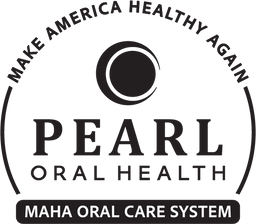Do you ever wonder what that sometimes tingly, sometimes downright burning sensation is when you use mouthwash? It may seem normal for your mouth to burn a little when using an oral rinse, but not every mouthwash causes this sensation—it may be a clue that your mouth is being overly irritated.
Why Mouthwash Burns
If your mouthwash leaves you with a burning sensation, it is probably caused by one of these common ingredients:
- Alcohol—Alcohol (ethanol) is a common ingredient used in mouthwash and is often the culprit of that strong burning sensation you get from swishing mouthwash around. While effective at killing germs, there have also been multiple studies linking alcohol-based mouthwash to an increased risk of oral cancer (1), which is why we strongly recommend avoiding this ingredient altogether.
- Menthol—Used for its alleged anti-microbial (aka germ-killing) properties, menthol can also cause strong burning sensations as an oral rinse. Menthol has a strong minty flavor, so you may not be surprised to find it commonly used in gum and toothpaste as well.
- Essential Oils—Sometimes, a tingling feeling from your mouthwash may be from a high concentration of certain essential oils. Peppermint and eucalyptus oils are often used in mouthwash, as they provide a refreshing taste.
- Hydrogen Peroxide—Hydrogen peroxide is a mild antiseptic, and is often used as a mouthwash. If a low concentration is used, you shouldn’t feel more than a mild tingly sensation, however, it may elicit a burning feeling if you are prone to sensitivity.
Everyone is different, so if your mouthwash doesn’t contain one of these ingredients and still causes tingling or burning, you may be sensitive to another ingredient. Consider chatting with your dentist if this is the case to determine what you might be sensitive to.
Is It Good if Mouthwash Burns?
Some people think that the burning sensation that some mouthwash causes is an indication that the product is working effectively. However, there are great natural alternatives that will give you all of the benefits of traditional mouthwash without the burning feeling or toxic chemicals. In short, the burning caused by mouthwash has everything to do with its ingredients and little to do with its effectiveness.
Tips for Selecting a Mouthwash
Not all mouthwash is created equal. Here are some tips for selecting mouthwash:
- Go natural—we always recommend using all-natural products, and the same goes for mouthwash. Make sure you select a mouthwash with natural ingredients so that you’re not putting any potentially toxic ingredients in your body.
- Try oil pulling—this is a great (and natural) method for rinsing and cleaning your teeth. You just need a bit of coconut oil to try it out! Learn more about oil pulling here.
- Use an oral probiotic rinse—this type of mouthwash can be a great option as it has been found to help reduce bad breath(2), fight gingivitis(3), and prevent plaque build-up(4).
When looking for an effective and safe mouthwash, make sure you check out all of the ingredients. We especially recommend avoiding alcohol, as it can cause irritation and has been linked to serious conditions including oral cancer(1).
Benefits of Using Natural Mouthwash
The first thing to know is, mouthwash is never a replacement for brushing and flossing. These are the most effective ways to clean your teeth and prevent cavities.
That said, mouthwash can be a nice addition to your oral care routine and help provide an extra dose of fresh when you need it. And when you use a natural mouthwash, there are even more benefits, including:
- Doesn’t dry out your mouth—mouthwash containing alcohol can dry out your saliva, which is bad for oral health. A natural rinse won’t dry you out—instead, your mouth should feel refreshed and just all-around great!
- Gentle on sensitive mouths—the ingredients in natural mouthwash are gentle enough for even the most sensitive mouths. This is because all the ingredients are safe and toxic-free.
- Supports oral health—as mentioned earlier, mouthwash with probiotic properties is great for your oral health. It can help fight gingivitis(3), deter bad breath(2), and prevent plaque(4).
- No “burning” sensation—If you’re using a truly natural mouthwash, you shouldn’t experience that uncomfortable burning feeling most mouthwashes leave you with. That’s because natural mouthwash doesn’t contain harsh additives like alcohol.
How and When to Use Mouthwash
If you’re using a natural mouthwash as we recommend, you can use your mouthwash as often as you want—there’s no need to worry about overdoing it! Rinsing in the morning and evening is a great way to keep your mouth feeling fresh and clean.
If you do opt to use a mouthwash containing other ingredients—such as alcohol or fluoride—just remember that these ingredients can cause harm and unnecessary sensitivity. So, make sure to notice if you’re experiencing any extra sensitivity, and consider switching to a natural option if you do.
Conclusion
Just like toothpaste, mouthwash is going in your mouth, so using safe and all-natural ingredients is very important. If you’re looking to up your oral health game, make sure to check out our Pearl Oral Health products. Each product is safe and effective, designed by a team of dentists to help you take care of your oral health—naturally!
Sources:
[3] Per Krasse, Birgitta Carlsson, Carina Dahl, Annette Paulsson, Asa Nilsson, Gabriela Sinkiewicz. “Decreased gum bleeding and reduced gingivitis by the probiotic Lactobacillus reuteri” National Library of Medicine. Published 2006. https://pubmed.ncbi.nlm.nih.gov/16878680/
[4] PM Harini, RT Anegundi. “Efficacy of a probiotic and chlorhexidine mouth rinses: A short-term clinical study” Journal of Indian Society of Pedontics and Preventative Dentistry. Published 2010. https://www.jisppd.com/article.asp?issn=0970-4388;year=2010;volume=28;issue=3;spage=179;epage=182;aulast=Harini


